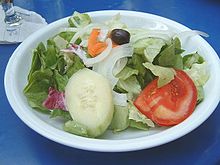Diet (nutrition)

In nutrition, diet is the sum of food that is eaten by a person or another organism.[1] Dietary habits are the usual decisions someone or a culture makes when choosing what foods to eat.
In discussing diet, the key issue is the change in work done. People have moved from manual work to office-type work, and to houses which have washing machines (et cetera). This has happened usually without changes in eating habits set during childhood. This is the basic reason why people get fat, with all the problems which follow.[2]
With the word diet, it is often expressed the use of specific intake of nutrition for health or weight-management reasons (with the two often being related). Although humans are omnivores, each culture and each person holds some food preferences or some food taboos, due to personal tastes or ethical reasons. Individual dietary choices may be more or less healthful. A proper nutrition requires a proper ingestion and, also important, the absorption of vitamins, minerals, and food energy in the form of carbohydrates, proteins, and fats. Dietary habits and choices play a significant role in health and mortality, and can also define cultures and play a role in religion.
Diets are about eating the right quantity and type of food at the right time. When people talk about a diet, they are usually referring to a special kind of diet. When someone says they are "dieting", it means that they are trying to lose weight. People who study diet and eating habits are called dietitians. When the diet is not right, people can gain or lose weight. They may become overweight or underweight. To get back to their normal weight, they need to change their diet.[source?] This may be very hard to do. Often help from a specialist is required.
Some people will also do fasting - they will not eat anything for some time to lose weight, balance their diet and clean their bodies.[3]
Some people have diseases where they cannot eat certain foods without becoming very sick. They need to change their diet to avoid these foods. A food allergy is a condition in which a specific food makes someone sick. Phenylketonuria is a disease in which a person cannot digest certain foods properly because they have an amino acid, or type of chemical, called phenylalanines in them.
A fad diet is a type of diet that becomes popular for a short time without any major health organizations recommending it.
Health agencies recommend that people maintain a normal weight by limiting consumption of energy-dense foods and sugary drinks, eating plant-based food, limiting consumption of red and processed meat, and limiting alcohol intake.
Related pages[change | change source]
References[change | change source]
- ↑ noun, def 1 Archived 2010-01-07 at the Wayback Machine askoxford.com
- ↑ "Told to Eat Its Vegetables, America Orders Fries" article by Kim Severson in The New York Times September 24, 2010, accessed September 25, 2010
- ↑ Fleming, Amy (27 January 2015). "Fasting facts: is the 5:2 diet too good to be true?" – via www.theguardian.com.
